
HERE’S WHY THE UK MUST STOP ITS WARPLANE DEAL WITH FASCIST ERDOĞAN
Posted: 2nd April 2025
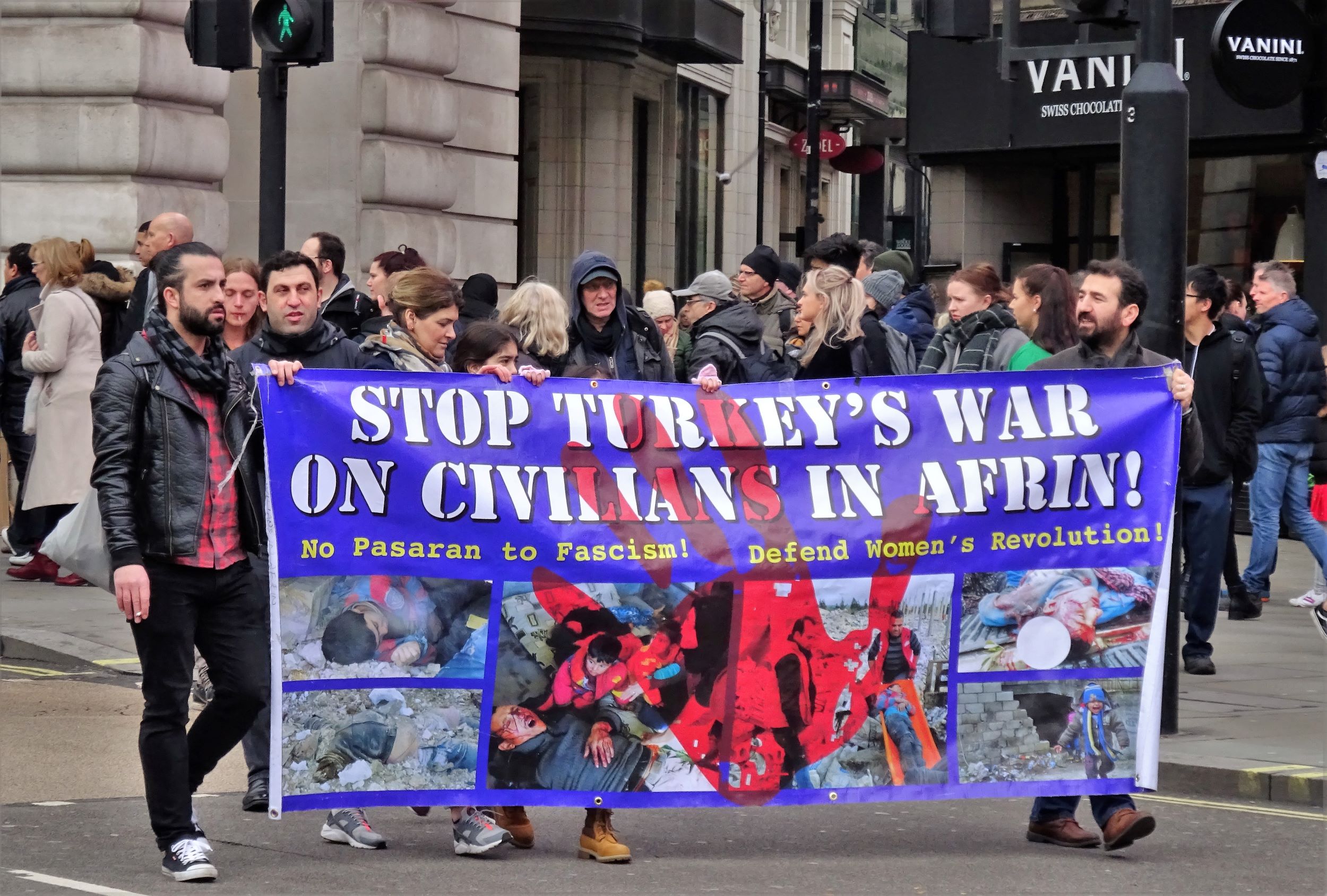
HERE’S WHY THE UK MUST STOP ITS WARPLANE DEAL WITH FASCIST ERDOĞAN
Negotiations appear to be nearing a conclusion for the sale of 40 Eurofighter Typhoon combat aircraft to Turkey by the UK. Turkey under President Erdogan is a highly authoritarian regime, engaged in deepening repression of political opposition, and a brutal war against both its own Kurdish population and Kurdish regions in neighbouring Iraq and Syria. This potential sale must be opposed and stopped before it is agreed.
31 MARCH 2025
- BLOGS
- ARMS EXPORTS BAE EUROFIGHTER IRAQ SYRIA TURKEY
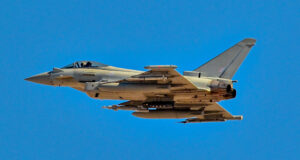
Tomás Del Coro, CC BY-SA 2.0
RAF Eurofighter Typhoon, NevadaSam Perlo-Freeman and Emily Apple
Over the past year, there have been reports, growing steadily more specific and solid, of Turkey’s interest in buying the Eurofighter Typhoon combat aircraft, and that negotiations towards such a deal are progressing. The Eurofighter is produced jointly by the UK, Germany, Italy and Spain, but each country has its own final assembly line, and carries out its own marketing for exports. The consent of all four partners is needed, however, for any export deal. In the case of Turkey, the UK is taking the lead. In the past, Germany objected to any potential sale, due to Turkey’s abysmal human rights record and military occupation of parts of northern Syria, but last year these objections were lifted. There are growing signs that negotiations may be nearing a conclusion.
The search for a new fighter jet
Turkey has been looking for new advanced combat aircraft to replace its ageing US F-16s for some time. It was part of the F-35 stealth fighter programme – the plane produced by the US, with significant contributions from the UK and seven other partner nations, and with orders from around 20 countries in total. However, the US kicked Turkey out of the programme in 2019 for buying Russian S-400 air defence systems which, the US said, meant that Russia could get potentially compromising data on the F-35s through the sensors embedded in the air defences. Traditional rival Greece’s purchase of France’s Rafale fighter in 2022 has increased the Turkish governments urgency to find something to match it.
Turkey has agreed to buy 40 new F-16s – more modern versions than their current ones – which unlike the F-35, the US is willing to sell them. But they are also still very interested in the Eurofighter, perhaps to diversify from dependence on the US.
Turkey is also working on developing its own combat aircraft, the Kaan, supported by BAE Systems, who are providing technology as part of a £100m contract signed in 2017 between the Turkish and UK governments.
The search for new customers
The UK, for its part, is very keen to make a sale. Since the end of Eurofighter deliveries to Saudi Arabia and Oman, the pipeline of orders has been much thinner, although the 24 ordered by Qatar in 2018, for which deliveries are expected to conclude this year, was an exception. Qatar has reportedly agreed to buy 12 more, though no contract has been signed. In addition, Germany, Spain, and Italy have all ordered more Eurofighters – although the final assembly for these planes will take place in the buyer countries. Nonetheless, the government and BAE still want more to ensure that production of the Typhoon at BAE Warton in Lancashire continues until the next-generation Tempest or Global Combat Air Programme – currently in the early stages of development – gets fully under way, probably in the 2030s. Frequently, a key motivation of major arms exports is to maintain this continuity of production, for fear of losing technological capability and practical know-how in the event of a long gap.
With Germany lifting its objections (Italy and Spain never raised any), there do not seem to be any major obstacles to a UK sale to Turkey. Most recently, on 30 January, a Turkish defence ministry spokesperson said that a requirements document for 40 Eurofighters had been sent to the UK. In response, the UK submitted a price proposal to Turkey in March. In a further sign that a deal is now looking more likely than not, Turkey is moving to buy Meteor air-to-surface missiles from France to arm the potential Typhoons – in spite of objections from Greece – which France’s President Macron has rejected.
For CAAT, however – and for the many victims Erdoğan’s brutal regime – there are compelling reasons to object to the proposed deal.
State repression
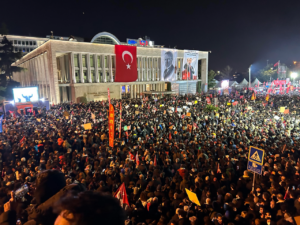
CC BY-SA 4.0, https://commons.wikimedia.org/w/index.php?curid=162805195
Protestors Demonstrating in Istanbul Metropolitan Municipality building. By u/Responsible-Cover207 – https://tinyurl.com/2s3cyzxtFirstly, there is the heavy repression of human rights, including freedom of speech, freedom of association, and freedom of the press within Turkey. Since the failed coup attempt against the AKP government of President Erdoğan in 2016, there has been a severe crackdown on a broad range of opposition. This included, initially, anyone associated with the Gülen religious movement accused of being behind the coup attempt. However, in practice, this led to Erdoğan seizing control of all state institutions, detaining, suspending, or placing under investigation 58,000 soldiers, police, judges, teachers and government workers in a purge of anyone deemed critical of his regime.
Journalists and political opposition figures are also often targeted. Reporters Without Borders (RSF) rates Turkey 58th out of 180 states for media freedom. According to RSF, 90% of the national media is now under government control. Critical journalists and media are subject to arbitrary arrest and closure, and spurious lawsuits, with many accused of ‘supporting terrorism’. Online censorship has also taken a serious turn for the worse, with the passage of a disinformation’ law in 2022, criminalising the sharing of information deemed to be false. Social media is regularly shut down and many accounts are banned and websites blocked.
This repression is still continuing. In February, the Turkish state detained 282 people including lawyers, journalists, and LGBTQ campaigners. A range of organisations were targeted including members of numerous left-wing and pro-Kurdish opposition parties. Then in a further escalation of repression on March 19, the popular opposition Mayor of Istanbul, Ekrem Imamoğlu, the main opposition candidate against President Erdogan for the next elections, was arrested and charged with ‘terrorist’ offences. This has led to mass protests, which have been met with further repression, including the mass arrest of over 1,100 people in 5 days. The UK government has been, sadly but unsurprisingly, silent about this massive repression by a supposedly democratic NATO ally.
War against the Kurds
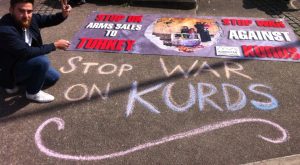 Kurdish activist at DSEI arms fair, 2017
Kurdish activist at DSEI arms fair, 2017However, it has always been, and still is, the Kurdish communities and Kurdish-led political parties that have faced the most extreme repression. The repression is particularly severe in Bakur – the Kurdish majority south-east of the country.
Since 1984, the Turkish state has been engaged in an internal armed conflict with the Kurdish armed group the Kurdistan Workers Party (PKK), which arose as a result of the severe political, cultural, and linguistic repression of the Kurdish minority population, concentrated in the south east of the country. During the 1990s, Turkey engaged in a brutal military campaign in which at least 40,000 people were killed and at least 2,400 villages destroyed by the Turkish armed forces. Torture, disappearances, and extra-judicial executions were commonplace. Atrocities were also committed by the PKK against civilians in the areas they controlled, as well as bombings against civilian targets in other parts of Turkey.
While the intensity of the conflict has reduced, it remains ongoing, with 152 people killed in 2023, according to the Heidelberg Institute for International Conflict Research(HIIK), which classed the conflict as a “limited war”. Turkey has also engaged in bombing campaigns against the PKK in neighbouring Iraqi Kurdistan, which have killed significant numbers of civilians.
The PKK leader, Abdullah Öcalan, has been held in isolation on the Imrali prison island since 1999. Öcalan’s writing on democratic confederalism, placing emphasis on direct democracy, gender equality and ecology has been central to the way Kurdish communities organise both in Bakur and Rojava, as well as inspiring radical organising internationally. Ending Öcalan’s isolation has been a key demand for Kurdish campaigners for years, and he is viewed as a central part of the peace process. In February 2025, he issued a call for a ceasefire, and laying down of arms, which has been accepted by the PKK.
In 2015/16 uprisings in support of the Rojava revolution in Sur, the ancient district in Amed (Diyarbakır) and Cizîr (Cizre), and other Kurdish regions were brutally surpressed. Sur, a UNESCO World Heritage site, whole neighbourhoods were reduced to rubble, and what is described as the “longest curfew in history” was imposed. Hundreds were killed and thousands displaced. In Cizîr, hundreds of civilians were killed, and homes destroyed after Turkish military forces bombed residential area. In one horrific attack, 177 people sheltering in a basement were burnt alive.
While recently there has been less direct military action, the repression still continues. All political and civil society organising in Bakur is subject to systematic repression with elected politicans, journalists, teachers, musicians, lawyers, and trade unionists facing regular arrests, investigations and imprisonment. Successive Kurdish political parties have been banned, alongside NGOs and other civil society organising platforms. Former HDP (Kurdish People’s Democratic Party) leader Selahattin Demirtas has been imprisoned since 2016 and former MP Leyla Güven was jailed for 22-years in 2020 on trumped up terrorism charges.
Erdoğan frequently sacks elected mayors and regional governors in this region that come from pro-Kurdish parties, replacing them with kayyıms (trustees) from his party. Since the local elections in 2024, Erdoğan has replaced ten mayors with trustees from his ruling AKP party. In Van, this has led to widespread protests and repression that included detaining 40 people, including 5 children.
Syria
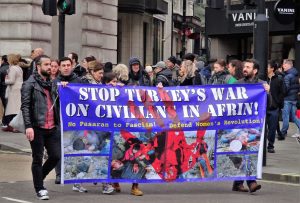
The most dangerous focus of the Turkish-Kurdish conflict at present is perhaps north-east Syria, where Turkey has occupied significant territory since 2018, as part of its attacks against Kurdish forces there. The Rojava autonomous region of northern Syria – now known as the Democratic Autonomous Administration of North and East Syria (DAANES) was formed during the ongoing Syrian civil war. While the majority of Rojava is Kurdish, its population also includes Arabs, Turkmen Assyrians, Yazidis and others. Rojava developed a radical, democratic, and decentralised form of self-government, based on the ideas of Öcalan with the Kurdish-dominated YPG (People’s Protection Units) and YPJ (Women’s Protection Units) central to the defeat of Daesh (ISIS) in Syria. The main armed force of the region is the Syrian Democratic Forces (SDF), of which the main part is the Kurdish-dominated People’s Protection Units (YPG), which has links with the PKK.
In January 2018, Turkey launched a military operation, codenamed “Olive Branch”, in the Afrin region, along with allied Syrian opposition forces, capturing the town of Afrin from the SDF. According to HIIK, at least 1,600 people were killed in this war, including at least 300 civilians, and at least 150,000 people were displaced. Turkey then launched a much larger assault in October 2019, codenamed “Peace Spring”, capturing large swathes of territory, including the city of Manbij. This assault killed well over a hundred civilians, and displaced hundreds of thousands.
Turkish forces and their Syrian allies are accused of ethnic cleansing, and other war crimes, including summary killings. In one particularly shocking case, Kurdish female politician Hevrin Khalaf was ambushed, dragged out of her car, beaten and shot dead in cold blood by fighters from pro-Turkish militia Ahrar al-Sharqiya.
The conflict reignited following the overthrow of Syrian President Bashar al-Assad, and the coming to power of opposition forces allied with Turkey, which has seized the opportunity to renew attacks on DAANES. Militia in the region allied to Turkey have seized more territory, supported by Turkish bombing campaigns, and are threatening to lay siege to the city of Kobane – famous for its courageous resistance to Daesh in 2014-15. Turkey has bombed the Tishreen dam, cutting off water and electricity to Kobane, has frequently bombed ambulances, and in late January bombed a market place killing 8 civilians. Well over 100 people have been killed, and 100,000 civilians displaced by the advance of the Turkish-allied Syrian National Army.
A ray of hope emerged in March with an agreement between the SDF and the interim Syrian government to integrate the SDF into the new Syrian armed forces, and likewise regional civil institutions with those of the Syrian state. If successfully implemented, this may reduce the Turkish government’s motivation to further attack Rojava. However, considerable uncertainties remain in the implementation of the deal, with a large number of issues left unresolved – in particular, the extent to which autonomous institutions and governance will continue within Rojava, or whether the region simply becomes part of a centralised Syrian state. Meanwhile, there are absolutely no signs of Turkey moving to end or even reduce its military occupation of Syria.
Conclusion
The sale of Eurofighter Typhoon aircraft to Turkey would greatly bolster a highly repressive, authoritarian regime, that has frequently violated international law and committed war crimes, and which is engaged in warfare against its own people and those of its neighbours in Iraq and Syria. Not only would a sale send a powerful signal of support to the regime, there is a clear risk these planes could be used directly in these wars, which show no signs of ending, and indeed where the Turkish war in Syria has been intensifying. Nor have territorial disputes between Turkey and its neighbour, and fellow NATO-ally Greece, been resolved, as witnessed by Greece’s opposition to France’s sale of Meteor missiles. The sale of Eurofighters would make the region a more dangerous place.
At present, negotiations have not reached a conclusion, and it is possible that the proposed deal will not materialise – but it appears to be getting close. Now is therefore exactly the time for campaigners and civil society to make our objections known – before a deal is signed and sealed – and while there is still time for other technical, financial, and political obstacles to arise. One opportunity for protest will be the DSEI arms fair, which returns to London Docklands in September 2025, and where there will be large numbers of Turkish arms companies exhibiting, as part of a dedicated Turkish international pavilion. As always, DSEI will be met with large protests, which will undoubtedly, and rightly, focus primarily on Israel – but the other evils of the arms trade that DSEI promotes should not be forgotten!
Even if the UK government cannot be convinced to refuse a sale, there may be more chance of persuading Germany, often much more hesitant about arms trade with Turkey, especially if the Turkish state’s internal repression continues to escalate.
This arms deal may not be making the headlines right now, but this is both the time and potentially the best opportunity to change that.
 Campaign Against Arms Trade
Campaign Against Arms Trade